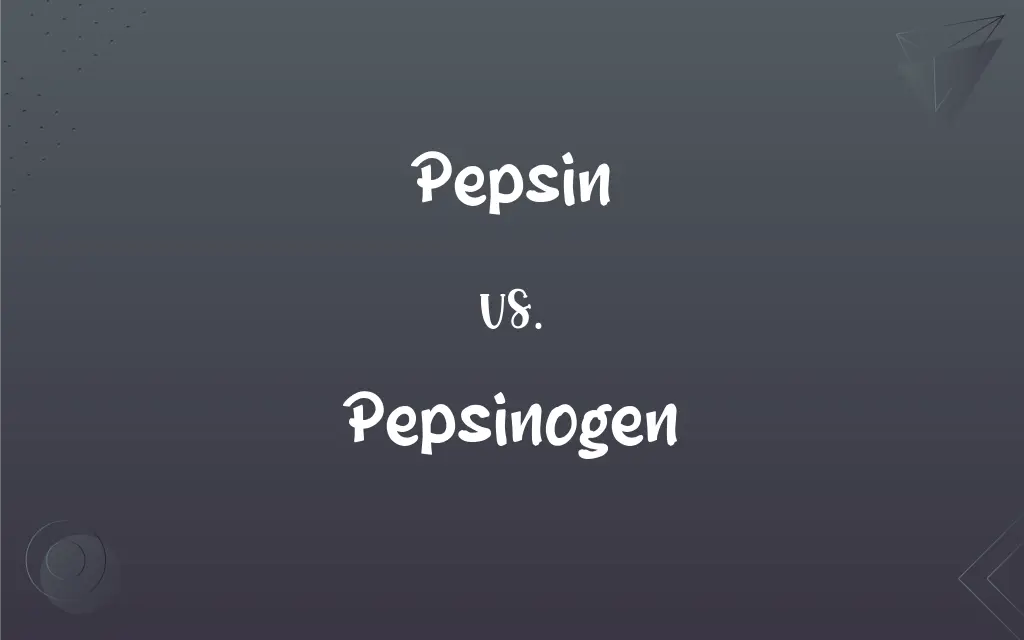Pepsin vs. Pepsinogen: What's the Difference?
Edited by Aimie Carlson || By Janet White || Published on December 16, 2023
Pepsin is an active digestive enzyme breaking down proteins, while pepsinogen is its inactive precursor form, secreted by stomach cells.

Key Differences
Pepsin is a crucial enzyme in the digestive system, specifically in the stomach, where it helps in the breakdown of proteins into smaller peptides. Pepsinogen, on the other hand, is the zymogen (inactive form) of pepsin. It's secreted by the gastric chief cells in the stomach lining.
Pepsinogen is converted to pepsin when exposed to the acidic environment of the stomach, particularly hydrochloric acid (HCl). This conversion is a key step in protein digestion, as pepsinogen is not enzymatically active until it becomes pepsin.
While both pepsin and pepsinogen are made of amino acids, their structures differ. Pepsin's structure allows it to cleave peptide bonds in proteins, facilitating digestion. Pepsinogen lacks this functional structure until activated.
Pepsin plays a vital role in nutrient absorption by breaking down proteins. In contrast, an imbalance in pepsinogen and pepsin levels can lead to digestive disorders. For instance, excessive pepsin can contribute to ulcer formation.
The secretion and activation of pepsinogen to pepsin are tightly regulated by hormonal and neural factors. This regulation ensures efficient protein digestion without damaging stomach tissues.
ADVERTISEMENT
Comparison Chart
State
Active enzyme
Inactive precursor
Function
Breaks down proteins
Gets converted to pepsin
Secretion Site
None, formed in the stomach
Gastric chief cells
Role in Digestion
Direct role in protein digestion
Indirect, as a precursor to pepsin
Health Impact
Vital for nutrient absorption; excess can harm
Imbalance can lead to digestive issues
ADVERTISEMENT
Pepsin and Pepsinogen Definitions
Pepsin
Pepsin is an endopeptidase active in acidic environments.
In the acidic stomach, pepsin effectively digests protein.
Pepsinogen
Pepsinogen is a zymogen, an inactive enzyme form.
As a zymogen, pepsinogen requires activation to function.
Pepsin
Pepsin is a protein-digesting enzyme in the stomach.
The steak was efficiently broken down by pepsin in the digestive process.
Pepsinogen
Pepsinogen’s structure is altered in the acidic stomach to form pepsin.
The acidic environment in the stomach modifies pepsinogen into its active form, pepsin.
Pepsin
Pepsin catalyzes the cleavage of peptide bonds in proteins.
Pepsin's role is crucial in converting complex proteins into simpler forms.
Pepsinogen
Pepsinogen is the inactive precursor of the enzyme pepsin.
Pepsinogen is converted into pepsin in the presence of stomach acid.
Pepsin
Pepsin originates from pepsinogen through enzymatic activation.
Pepsinogen turns into pepsin in the stomach's acidic milieu.
Pepsinogen
Pepsinogen activation is crucial for protein digestion in the stomach.
The digestion of proteins starts with the transformation of pepsinogen into pepsin.
Pepsin
Pepsin is essential for protein digestion in humans.
Without pepsin, our ability to digest protein would be severely hindered.
Pepsinogen
Pepsinogen is secreted by the gastric chief cells in the stomach.
The gastric chief cells release pepsinogen, which later becomes active pepsin.
Pepsin
A digestive enzyme found in gastric juice that catalyzes the breakdown of protein to peptides.
Pepsinogen
The inactive precursor to pepsin, formed in cells of the mucous membrane of the stomach and converted to pepsin by autocatalysis in the presence of hydrochloric acid.
Pepsin
A substance containing pepsin, obtained from the stomachs of hogs and calves and used as a digestive aid.
Pepsinogen
(biochemistry) A zymogen that is converted into pepsin by the hydrochloric acid in the stomach.
Pepsin
(enzyme) A digestive enzyme that chemically digests, or breaks down, proteins into shorter chains of amino acids.
Pepsinogen
A proenzyme, the antecedent of the enzyme pepsin. A substance contained in the form of granules in the peptic cells of the gastric glands. It is readily convertible into pepsin. Also called propepsin.
Pepsin
A proteolytic enzyme (MW 34,500) contained in the secretory glands of the stomach. In the gastric juice it is united with dilute hydrochloric acid (0.2 per cent, approximately) and the two together constitute the active portion of the digestive fluid. It degrades proteins to proteoses and peptides, and is notable for having a very low pH optimum for its activity. It is the active agent in the gastric juice of all animals.
Pepsinogen
Precursor of pepsin; stored in the stomach walls and converted to pepsin by hydrochloric acid in the stomach
Pepsin
An enzyme produced in the stomach that splits proteins into peptones
FAQs
What cells secrete pepsinogen?
Gastric chief cells in the stomach lining secrete pepsinogen.
How is pepsinogen activated?
Pepsinogen is activated to pepsin by the acidic environment in the stomach.
Does pepsin have a role in any diseases?
Excessive pepsin can contribute to stomach ulcers and acid reflux disease.
What is pepsin?
Pepsin is a digestive enzyme that breaks down proteins in the stomach.
Why is pepsin important?
Pepsin is essential for breaking down dietary proteins into absorbable forms.
What is pepsinogen?
Pepsinogen is the inactive form of pepsin, secreted by stomach cells.
Where is pepsin found?
Pepsin is found in the stomach, where it aids in protein digestion.
Can pepsin function in alkaline conditions?
No, pepsin requires an acidic environment to function effectively.
Can pepsin digest all types of proteins?
Pepsin can break down most dietary proteins, but not all.
What regulates pepsin activity?
Pepsin activity is regulated by the stomach’s acidity and the presence of dietary proteins.
Is pepsinogen active in its secreted form?
No, pepsinogen is inactive until it's converted to pepsin in the stomach.
What triggers the secretion of pepsinogen?
Pepsinogen secretion is stimulated by eating, when the stomach anticipates the need for protein digestion.
Can pepsin be taken as a supplement?
Yes, pepsin is available in supplemental form to aid in digestion.
Can pepsinogen be found in the blood?
Yes, in some conditions, pepsinogen can leak into the blood, often indicating certain gastric disorders.
Is pepsinogen a protein?
Yes, pepsinogen is a protein that becomes an active enzyme (pepsin) upon activation.
Can lifestyle changes impact pepsin levels?
Yes, diet and lifestyle changes can influence the production and activity of pepsin.
How is pepsinogen converted to pepsin?
The acidic gastric juice in the stomach converts pepsinogen to pepsin.
What factors affect pepsinogen secretion?
Factors like diet, stress, and certain medications can affect pepsinogen secretion.
Is there a test for pepsinogen levels?
Yes, blood tests can measure pepsinogen levels, often used in diagnosing gastric conditions.
What happens if there's too much pepsin?
Excess pepsin can damage the stomach lining, leading to ulcers and other issues.
About Author
Written by
Janet WhiteJanet White has been an esteemed writer and blogger for Difference Wiki. Holding a Master's degree in Science and Medical Journalism from the prestigious Boston University, she has consistently demonstrated her expertise and passion for her field. When she's not immersed in her work, Janet relishes her time exercising, delving into a good book, and cherishing moments with friends and family.
Edited by
Aimie CarlsonAimie Carlson, holding a master's degree in English literature, is a fervent English language enthusiast. She lends her writing talents to Difference Wiki, a prominent website that specializes in comparisons, offering readers insightful analyses that both captivate and inform.






































































